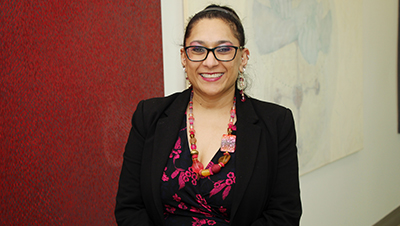Helping detect prostate cancer early - a simple blood test that can save lives
 Pictured above: Gerry is back right with his family. Pictured below: Dr Sanjana Kondola.
Pictured above: Gerry is back right with his family. Pictured below: Dr Sanjana Kondola.
September is prostate awareness month, which with more than 24,000 new diagnoses and 3,500 deaths this year alone, continues to hold the unpopular title of being the most common cancer in Australia.
The good news is prostate cancer can be detected with just a simple blood test called a prostate-specific antigen (PSA), and the earlier it is detected, the more treatable it often is.
Perth father-of-four and Rockingham General Hospital (RGH) patient, Gerry Sturmer, knows this better than most, after being diagnosed with prostate cancer at only 52 following a routine visit to his General Practitioner (GP) in October 2017.
“I had no symptoms,” Gerry explained.
“I went to my GP for a doctor’s certificate for something unrelated, and they suggested I have my prostate checked as I was over 50… that GP might have saved my life.
“I remember thinking about my children who were aged from six to 17 at the time – my own dad died when I was my oldest daughter’s age, and I didn’t want to put them through what I went through.
“Thankfully I had the operation, chemotherapy and radiotherapy before it was too late, and I live to tell the tale.
“Although I have been cancer-free for a few years now, it will impact me the for rest of my life – I have lost some functionality, and I’ll always need regular hormone injections and blood tests.
“I might have been able to avoid some of this treatment if I had been tested for prostate cancer sooner – the earlier you are diagnosed, the better your outcomes are likely to be.”

Dr Sanjana Kondola, who is Gerry’s oncologist at RGH, said men need to advocate for their own health and ask for a PSA blood test when they turn 50 and every two years until age 69.
“If there is history of prostate cancer in family, men should consider testing earlier.
“The earlier prostate cancer is detected the better, testing may identify fast-growing or aggressive cancers that have spread to other parts of the body or very slow-growing cancers that are unlikely to be harmful,” Sanjana said.
“However, if it has spread to other areas of the body like in Gerry’s case, it is not curable, but it is treatable.
“Gerry will have to be monitored for the rest of his life, receive regular hormone injections, scans and do radiation therapy if the cancer reappears anywhere else.”
Gerry went on to implore all people with prostates to take the time and get the blood test.
“Ten minutes out of your day could save your life,” he said.
“Us blokes often aren’t very good at taking our health seriously until we get a wakeup call – please let my story be your wakeup call!”
For more information about prostate cancer, visit the HealthyWA website (external link).
See your GP to arrange a Prostate specific antigen (PSA) blood test.


